I am building my first website (total newbie) using Angular and ASP.NET Web API. I can access my web app on localhost 4200 and using 192.168.100.2:4200 on my pc browser.
But when I try to log on the same localhost with a Mobile Phone Android Browser, It returns a server error.
Following are the commands I tried
ng serve --host 192.168.100.2
ng serve --host 192.168.100.2 --disable-host-check
ng serve --host 0.0.0.0
This is my Login method on the Component
login(){
if(this.loginForm.valid){
const record = this.loginForm.getRawValue();
console.log(record);
this.authService.login({
username: record.userName,
password: record.password,
}).subscribe({
next:(data: any) => {
this.authService.authToken = JSON.parse(data).token;
console.log("Orig Token: ", data);
console.log("Parsed Token: ", this.authService.authToken);
console.log("Parsed Token (Subject): ", this.authService.authToken.split('.')[1]);
console.log("JSON (after atob) ",this.authService.atob);
console.log("Object (Payload): ",this.authService.payLoad);
console.log("User id: ",this.authService.userID);
console.log("Name: ",this.authService.userName);
console.log("Modules: ",this.authService.accessibleModulesOfUser);
this.router.navigateByUrl('');
this.toastr.success("Welcome Back.")
},
error: (e) => {
if (e.status == 0) {
// this.msgs.push({ severity: 'warn', detail: 'Server is not available. Please try again later.' });
// this.toastr.error("Server is not available. Please try again later")
this.toastr.error("Server is not available. Please try again later")
}
else if (e.status == ApiCallStatusCodes.UNAUTHORIZED) {
// this.msgs.push({ severity: 'error', detail: err.error });
// console.log(e);
this.toastr.error(e.error)
}
else {
// this.msgs.push({ severity: 'warn', detail: err.error });
// console.log(e);
this.toastr.error(e.error)
}
}
})
}
else{
this.toastr.warning("Enter username and password.")
}
}
I already try adding Inbound Rule to my Windows Defender Firewal but it doesnt work.
Also, I modify the CORS in startup of ASP.NET but still has no luck.
public void Configure(IApplicationBuilder app, IWebHostEnvironment env)
{
if (env.IsDevelopment())
{
app.UseDeveloperExceptionPage();
app.UseSwagger();
app.UseSwaggerUI(c => c.SwaggerEndpoint("/swagger/v1/swagger.json", "WebAPIv5 v1"));
}
app.UseHttpsRedirection();
app.UseRouting();
app.UseCors(policy => policy.AllowAnyHeader().AllowAnyMethod().WithOrigins("http://localhost:4200", "http://192.168.100.2:4200"));
app.UseAuthentication();
app.UseAuthorization();
app.UseEndpoints(endpoints =>
{
endpoints.MapControllers();
});
}
